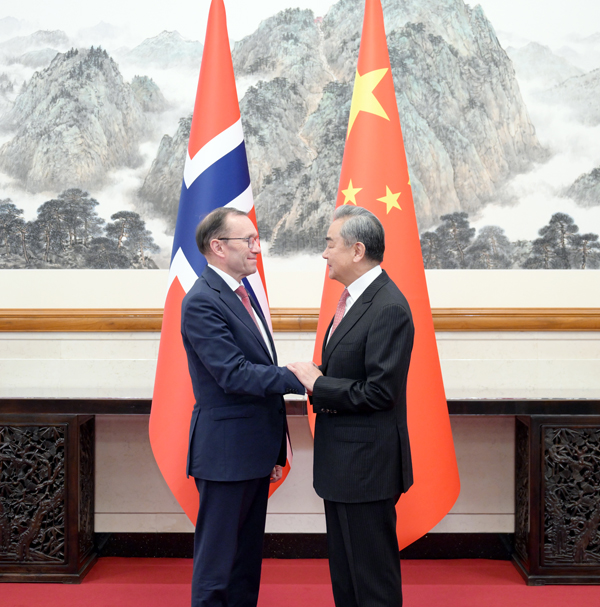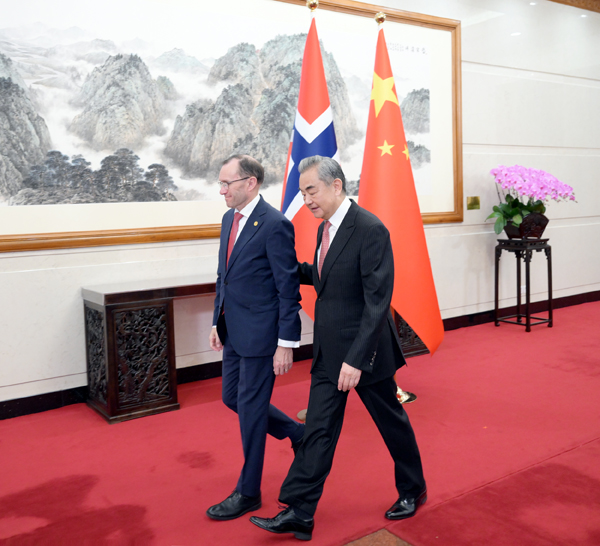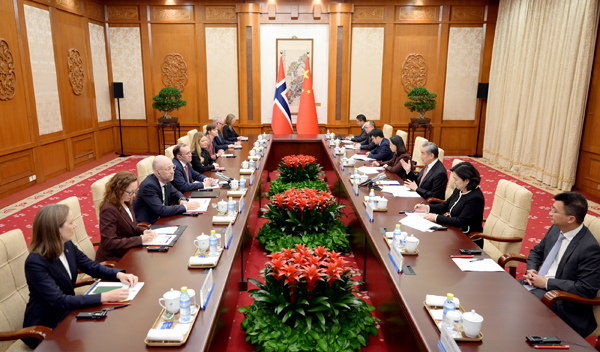
People’s Republic of China


On November 11, 2025, Member of the Political Bureau of the CPC Central Committee and Foreign Minister Wang Yi held talks with Minister of Foreign Affairs of Norway Espen Barth Eide in Beijing.
Wang Yi stated that Norway is one of the earliest countries to recognize and establish diplomatic relations with the People's Republic of China. China appreciates Norway's consistent adherence to the one-China principle and regards Norway as an important and stable partner in Europe. Last year, the two countries celebrated the 70th anniversary of the establishment of diplomatic relations, and President Xi Jinping met with Prime Minister Jonas Gahr Støre in Beijing, during which both sides agreed to create another splendid 70 years for China-Norway relations. Wang Yi expressed the hope that Norway will continue its positive, stable, pragmatic and rational policy toward China. Both sides should jointly follow through on the important common understandings reached by the leaders of the two countries, respect each other's core interests, accommodate each other's major concerns, continue to pursue openness, win-win cooperation, and mutual achievement, and take China-Norway relations to new heights and achieve new outcomes.
Wang Yi said that currently, the world is experiencing intensified turbulence and transformation, with unilateralism and protectionism actions seriously undermining the international order and rules. Norway has long supported multilateralism and free trade, playing a unique role in promoting solutions to international and regional hotspot issues. China is also a firm advocate, defender, and practitioner of multilateralism. President Xi recently proposed the Global Governance Initiative, whose core tenets are consistent with the purposes and principles of the United Nations (UN) Charter, being widely welcomed and supported by the international community. China is ready to work with Norway to jointly uphold multilateralism, resist "decoupling and disruption of industrial and supply chains", make the international system more just and equitable, and advance world peace, stability, and prosperity.

Espen Barth Eide said that Norway attaches great importance to developing relations with China. Prime Minister Jonas Gahr Støre's successful visit to China last year and the active implementation of the common understandings between the leaders of the two countries are advancing the China-Norway partnership in the right direction. Norway firmly adheres to the one-China policy and is willing to strengthen constructive dialogue and deepen practical cooperation with China to achieve mutual benefit. Norway highly commends China's great achievements in green transition and development as well as its contributions to the green transition of other developing countries. As a leader in Europe's green transition, Norway fully opens its market to Chinese electric vehicles and adopts a zero-tariff policy. Norwegian enterprises are optimistic about the Chinese market and look forward to expanding investment in and cooperation with China. Norway and China share a firm belief in multilateralism and support free trade. Norway values and appreciates China's contributions to world peace as a permanent member of the UN Security Council. The Global Governance Initiative put forth by President Xi Jinping is highly consistent with Norway's vision, and Norway is willing to work with China to jointly uphold the spirit of the UN Charter and support a rules-based multilateral trading system.
Both sides agreed to maintain close exchanges at all levels and uphold the partnership; strengthen the synergy of development strategies, and expand mutually beneficial cooperation in such areas as trade, maritime affairs, green development, and innovation; maintain openness and cooperation and foster a stable business environment for enterprises from both countries; enhance dialogue and communication, and promote the sound, stable, and sustainable development of China-Europe relations; and jointly practice multilateralism and free trade, and address climate change and other global challenges.
The two sides exchanged views on recent developments in the Middle East. Both sides welcomed the ceasefire in Gaza, the release of hostages and all those held captive, and improved humanitarian access, and emphasized the key role of the United Nations and the importance of adhering to the humanitarian principle. Both sides agreed that the ceasefire agreement should be earnestly implemented and that the international community, especially countries with influence over parties to the conflict, should provide necessary support for achieving a comprehensive and lasting ceasefire. The two foreign ministers emphasized that the Palestinian people should play a leading role in all matters concerning their national future and destiny.
Both sides expressed concern over Israel's continued expansion of settlements in the West Bank and East Jerusalem, which have been deemed illegal by the UN Security Council and the International Court of Justice. The two sides agreed that support should be given to strengthen the authority and governance capabilities of the Palestinian Authority. The ceasefire in Gaza must be linked to a political process aimed at implementing the two-State solution, enabling Israelis and Palestinians to live together in peace, security, and dignity. The two sides also discussed other hotspot issues in the Middle East and agreed to maintain communication and enhance cooperation through multilateral organizations.
The two sides also exchanged views on the Ukraine crisis and other issues of common concern.




